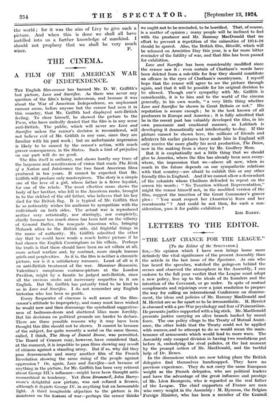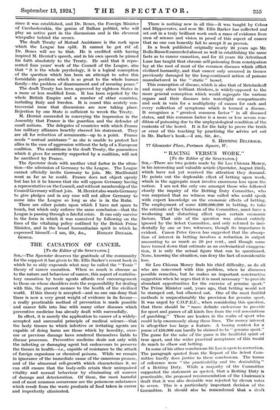LETTERS TO THE EDITOR.
" THE LAST CHANCE FOR THE LEAGUE."
[To the Editor of the SPECTATOR.] SIR,—No opinion which I have seen brings home more definitely the vital significance of the present Assembly than the article in the last issue of the Spectator. As one who has heard the speeches, watched the goings-on behind the scenes and observed the atmosphere in the Assembly, I can endorse to the full your verdict that the League must adopt a new policy, live up to the ideals of its founders and the intention of the Covenant, or go under. In spite of mutual compliments and rejoicings over a joint resolution to prepare the way for calling an international Conference on disarma- ment, the ideas and policies of Mr. Ramsay MacDonald and M. Herriot are so far apart as to be irreconcilable. M. Herriot is obsessed with a pre-War psychology and fear of Poincareism. He presents justice supported with a big stick. Mr. MacDonald: presents justice carrying an olive branch backed by moral force. The one policy clings to the Treaty of Mutual Assist- ance, the other holds that the Treaty could not be applied with success, and to attempt to do so -would mean the main- tenance of armaments which would lead to more wars. The Assembly only escaped division in having two resolutions put before it, embodying the rival policies, at the last moment by the prompt action of Mr. MacDonald, and the tactful help of Dr. Benes.
In the discussions which are now taking place the British delegates find themselves handicapped. They have no previous experience. They do not carry the same European weight as the French delegates, who are political leaders and have the advantage of the great influence and prestige of Mr. Leon Bourgeois, who is regarded as the real father of the League. The chief supporters of France are men who carry weight in the Assembly : M. Hymans, the Belgian Foreign Minister, who has been a member of the Council , since it was established, and Dr. Benes, the Foreign Minister of Czechoslovakia, the genius of Balkan politics,_ who will play an active part in the discussions and is the cleverest wirepuller behind the scenes.
The draft Treaty of Mutual Assistance is the rock upon • which the League has split. It cannot be got rid of.
Dr. Benes will see to that. He is credited with having inspired M. Herriot's speech, and in his own speech he pinned his faith absolutely to the Treaty. He said that it repre- sented four years' work of the Council of the League, also that " it is the whole psychology, it is a logical conception • of the question which has been an attempt to solve this formidable problem which is so great to the whole human family—the problem of disarmament and of securing peace."
The draft Treaty has been approved by eighteen States in a more or less modified form. It has been rejected by the whole British Empire and a number of other countries, including Italy and Sweden. It is round this acutely con- troversial issue that discussions are now taking place. Rejection by one State is sufficient to wreck the Treaty.
M. Herriot succeeded in conveying the impression in the Assembly that France is the guardian and the defender of small nations. The delegates of countries with which France has military alliances heartily cheered his statement. They are all for reduction of armaments—up to a point. France needs " mutual assistance " as she is unable to protect her allies in the case of aggression without the help of a European coalition. The conditions in the draft Treaty, the guarantees which it gives for security supported by a coalition, will not be sacrificed by France.
The Spectator deals with another vital factor in the situa- tion—the admission of Germany to the League. The League cannot officially invite Germany to join. Mr. MacDonald went as far as he could. France does not object openly but has let it be known that she will oppose Germany having a representative on the Council, and without membership of the Council Germany will not join. M. Herriot also wants Germany to give pledges and in any ease will not allow Germany to come into the League so long as she is in the Ruhr.
There are other points upon which I have not space to touch, but which only enforce the same conclusion—that the League is passing through a fateful crisis. It can only survive in the form in which it was conceived by following on the lines of the vitalizing policy outlined by the British Prime Minister, and in the broad humanitarian spirit in which he



































 Previous page
Previous page